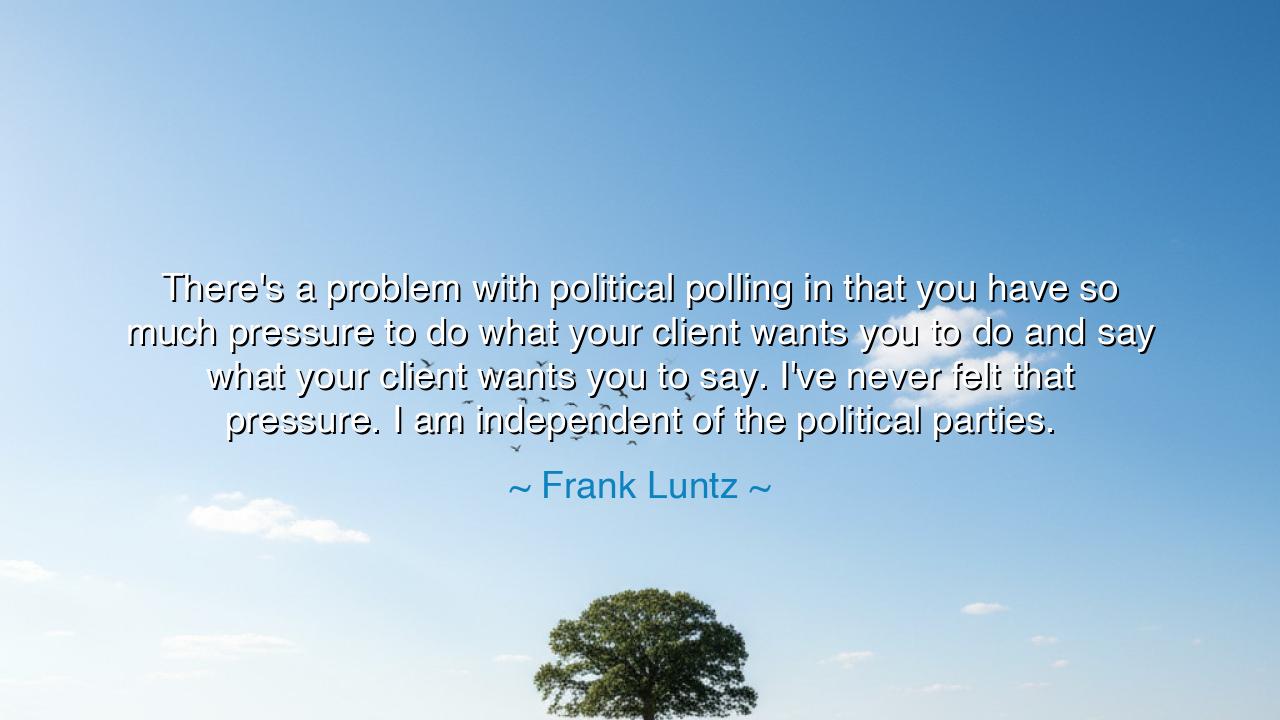
There's a problem with political polling in that you have so
There's a problem with political polling in that you have so much pressure to do what your client wants you to do and say what your client wants you to say. I've never felt that pressure. I am independent of the political parties.






The words of Frank Luntz reveal a truth that is as ancient as the art of politics itself: “There’s a problem with political polling in that you have so much pressure to do what your client wants you to do and say what your client wants you to say. I’ve never felt that pressure. I am independent of the political parties.” Here he speaks of the struggle between truth and power, between the purity of honest counsel and the corruption of servitude to masters who seek not wisdom but flattery. In every age, those who measure the will of the people face the temptation to twist their findings to please the mighty, yet the true servant of democracy must stand apart, unbent, and speak only what is.
The ancients called such men oracles and scribes of the people’s voice. In Athens, where democracy was young, it was the duty of free men to report truthfully in the assembly, not merely to echo the will of those in power. When the seer spoke falsely to please a king, the city suffered; but when he spoke with courage, even at the risk of wrath, the polis grew stronger. Luntz’s declaration of independence is an echo of this same principle: the voice of the people must never be distorted to feed the ambitions of the few.
Consider the story of Cassandra of Troy. She spoke the truth that her people did not wish to hear, warning them of the wooden horse. Because her voice did not flatter, she was dismissed, and her city was undone. So too in politics, when the pollster or advisor bends the truth to satisfy their client, they lead not only themselves but the nation to ruin. Better the scorned truth than the comfortable lie.
The meaning of Luntz’s words is thus a call to integrity. Polling is not mere numbers; it is the measure of human will, the mirror of a people’s soul. To corrupt it with partisan desire is to blind leaders and betray citizens. But to guard it with honesty, even when inconvenient, is to protect the very foundations of a free society. The independent voice may be lonely, but it is also the most necessary, for without it the chorus of democracy collapses into deceit.
Let the generations remember: truth is not owned by any party. It belongs to the people, and those who measure it must guard it as a sacred trust. The wise pollster, like the wise prophet, must resist the pressure to please, and instead cling to what is real. For only by standing independent can one serve the greater good, and only by refusing corruption can the voice of the people be heard in its true strength.






TLThu Le
Frank Luntz’s experience of avoiding the pressures that influence political polling is admirable, but how rare is this? It makes me wonder whether polling firms are truly independent or if their methods are often shaped by their clients’ needs. Can political polling be truly transparent when there’s a constant demand for specific narratives? What can be done to ensure that polling results represent an accurate, unbiased snapshot of public opinion?
TLLe Thi Tuyet Lan
This quote by Luntz draws attention to the ethical challenges in political polling. If clients are pushing for specific outcomes, how much of the polling data we receive is actually reflective of public opinion, and how much is shaped by those with power or money? Is it possible for polling to remain truly independent in such a politically-driven landscape, or is the very nature of polling inherently influenced by external pressures?
BLAnh Chi Bui Le
Luntz’s statement is quite revealing, as it touches on the potential manipulation of polling data. Can polling ever truly be independent if it’s conducted within such a highly charged political environment? Even when a pollster claims to be independent, are there subtle biases that inevitably creep in? This makes me wonder how we can trust polling results when there’s so much room for influence from political stakeholders.
TBDong thi bac
Frank Luntz’s comment about the pressure to cater to clients in political polling highlights an important issue. It raises the question: how often is polling influenced by outside interests or biases? Luntz’s claim to independence is refreshing, but can any poll truly be unbiased, especially when the stakes are so high in political campaigns? How do we ensure that polling remains objective and serves the public interest rather than political agendas?